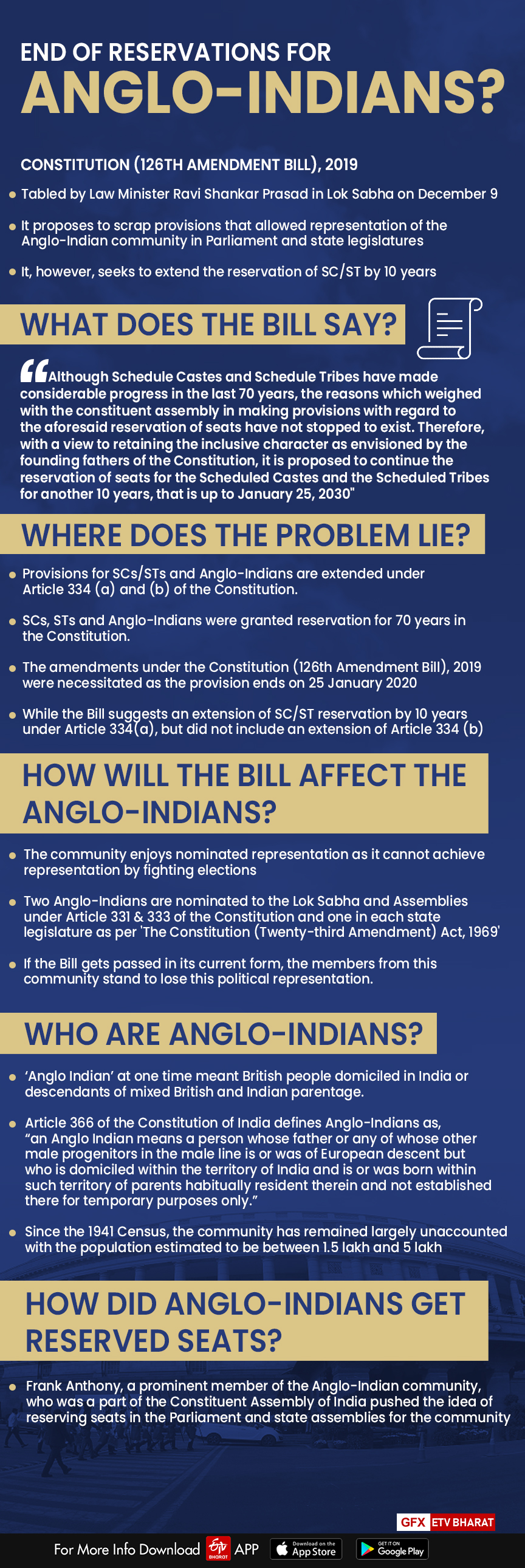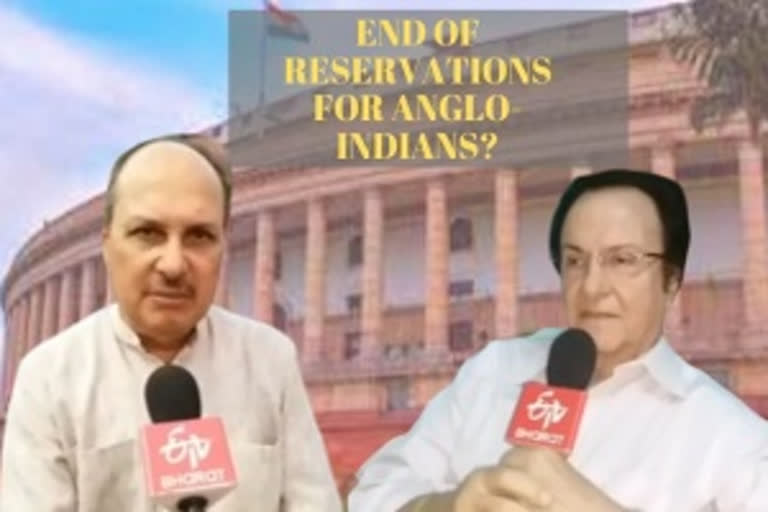Hyderabad: The centre's decision to table the Constitution (126th Amendment Bill), 2019 in the Lok Sabha, which proposes to do away with the provisions that allowed representation of the Anglo-Indian community in the Parliament and the state legislatures, while extending the reservation of Scheduled Castes (SC) and Scheduled Tribes (ST) by 10 years has invoked sharp criticism from the former.
Charles Dias, a former nominated Member of Parliament representing the Anglo-Indian community, is one among several members from the community to have vehemently opposed the central government's move to strip Anglo-Indians of their quota.
Describing the Centre's move as "cruel", Dias said, "The present move of the central government to deny the nomination to Lok Sabha and state legislative assemblies is a (form of )cruelty to Anglo-Indians. Union Cabinet minister Prakash Javadekar stated that the Anglo-Indians are now well-off, and hence they don't require reservation through nomination. This is entirely based on faulty data."
Referring to a 2018 study done by the Ministry of Minority Affairs on the social and economic status of the Anglo-Indian community, Dias said, "The ministry of minority affairs brought out a report in 2018 based on scientific study and it said that the Anglo-Indians are financially, and educationally facing disabilities (backwards)."
"Government departments must come forward and study the matter and come out with solutions to address our grievances, instead of scrapping our quota," added Dias.
Continuing his tirade against the Bill, Dias said, "The Bill which the government expects to clear in both houses of Parliament within week reflects the step-motherly attitude of the central government towards the small and microscopic minority. This is cruelty. This has to be rectified."
Dias's apprehensions found an echo in a statement made by Congress' Kerala MP Hibi Eden, who cited another study conducted in 2013 by a joint parliamentary fact-finding mission, and told The Hindu, "In 2013, Members of Parliament visited five major cities, including Kolkata, Hyderabad, Chennai and Cochin. The report says that there has been no improvement in the economic and social sectors of this community and reservation has to be continued.”
Eden represents Ernakulam, which has a sizeable population of Anglo-Indians.
George Baker, presently representing the Anglo-Indian community in 17th the Lok Sabha and a member of the BJP, also criticised the Bill and said, "Just because the Parsi community has someone like the Tata's does that mean that the community should not be given any hope to live?"
"Doing away with a community is harmful to the country. I only hope this is not politicised to that extent where enimosty is created. We are loyal and we try to do our best, " said Baker.
Baker, an Anglo-Indian himself, has requested an appointment with the Prime Minister present the case of the community.
"I have written an email to the PMO seeking a meeting with a small delegation of Anglo-Indians to present our case," said Baker.
Elaborating on the demands likely to be made by the community members to the government, Baker said, "Our demands are very few. We demand preservation of our community. We do not wish to bring anything religious into it. If a community is small, does it mean that it should not have representation?
"We only want representative reservation in state assemblies and Parliament, " added Baker.
The controversial move of the Centre has been facing flak from the Opposition as well, including ruling Bharatiya Janta Party's arch rival, All India Trinamool Congress (AITC) with party MP Saugata Roy opposing the introduction of the Bill, while accusing the government of depriving the Anglo-Indian community of representation.
“When our Constitution was made, there was protection for Anglo-Indians, which is being dropped. This was given by Babasaheb Ambedkar and Jawaharlal Nehru and, today, the government has suddenly decided to abolish it by removing two seats for the Anglo-Indians in the Lok Sabha and in assemblies. For this reason, I have given a notice opposing the introduction of the bill," Roy said in the House.

Responding to Roy’s concerns, Union law minister Ravi Shankar Prasad, who had introduced the amendment bill, said that he would give a more detailed response when the bill is taken up for passage.
“This constitutional amendment will allow extension of SCs and STs for 10 years. Our government is committed to the cause of SCs and STs. This is not a nomination but representation. This is a question of merit," Prasad said.
Before laying the Bill in the Lok Sabha, Law Minister Ravi Shankar Prasad said that while the merits of the Bill could be gone into during the debate, the extension of reservation to the SC and ST communities was for representation, while the Anglo-Indian community was nominated.
“According to the 2011 census, there are 296 members of the Anglo Indian community in the entire country. However, I would still maintain that we have not closed our minds to revisiting the issue,” he said.
What does the Bill say?
"Although Scheduled Castes and Scheduled Tribes have made considerable progress in the last 70 years, the reasons which weighed with the constituent assembly in making provisions with regard to the aforesaid reservation of seats have not stopped to exist. Therefore, with a view to retaining the inclusive character as envisioned by the founding fathers of the Constitution, it is proposed to continue the reservation of seats for the Scheduled Castes and the Scheduled Tribes for another 10 years, that is up to January 25, 2030," the proposed Bill states.
Where does the problem lie?
Provisions for SCs/STs and Anglo-Indians are extended under Article 334 (a) and (b) of the Constitution. SCs, STs and Anglo-Indians were granted reservation for 70 years in the Constitution.
The amendments under the Constitution (126th Amendment Bill), 2019 were necessitated as the provision ends on 25 January 2020.
While the Bill suggests an extension of SC/ST reservation by 10 years under Article 334(a), but did not include an extension of Article 334 (b).
How will the Bill affect the Anglo-Indians?
The right of the community to have nominated representation in the Parliament is enshrined in the constitution to ensure due representation in the legislatures to the microscopic minority community which cannot achieve representation through fighting elections.
Two Anglo-Indians are nominated to the Lok Sabha and Assemblies under Article 331 & 333 of the Constitution and one in each state legislature as per 'The Constitution (Twenty-third Amendment) Act, 1969'.
If the Bill gets passed in its current form, the members from this community stand to lose this political representation.
Despite the government claiming that the community is doing well, in Kerala, where the community is largely concentrated, is officially recognised as a backward class after thorough studies done by expert commissions from time to time.
It is listed among the Other Backward Communities (OBC) owing to their poor social and economic condition.
Who are Anglo-Indians?
‘Anglo Indian’ at one time meant British people domiciled in India or descendants of mixed British and Indian parentage.
Article 366 of the Constitution of India defines Anglo-Indians as, “an Anglo Indian means a person whose father or any of whose other male progenitors in the male line is or was of European descent but who is domiciled within the territory of India and is or was born within such territory of parents habitually resident therein and not established there for temporary purposes only.”
While a huge chunk of the minority community has already migrated to Commonwealth nations post Independence, those who stayed back in India have largely remained unaccounted for as a community since the 1941 Census, but the current resident population is anywhere between 1.5 lakh and 5 lakh.
Why do Anglo-Indians have reserved seats?
Frank Anthony, a prominent member of the Anglo-Indian community, represented the community in the Constituent Assembly of India.
Being a part of the Advisory Committee and Sub-Committee on Minorities, he pushed the idea of reserving seats in the Parliament and state assemblies on the account of the community lacking a state of its own and the fact that they were too small and geographically spread out in order to get elected and therefore represent the communities interest politically.



